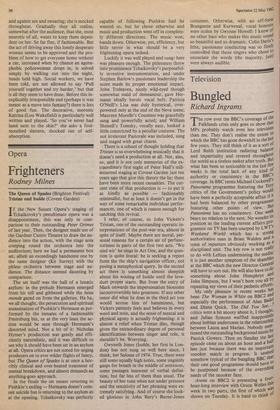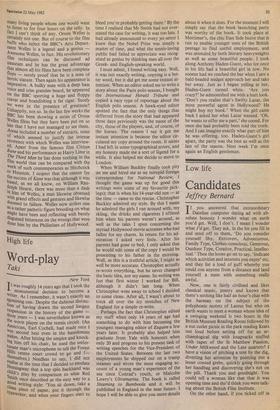Television
Bungled
Richard Ingrams
The row over the BBC's coverage of the Falklands crisis only goes to show that MPs probably watch even less television than me. They don't realise the extent to which the BBC has gone downhill in the last, few years. They still think of it as a sort 01 Lord Reith institution radiating balance and impartiality and revered throughout the world as a tireless seeker after truth. But what has been so noticeable in the last few weeks is the total lack of any kind 0,1 authority or consistency in the BBC,5 coverage. In BBC terms Michael Cockerel' 5 Panorama programme featuring the Tory critics of the Government's policy wow' have been a perfectly acceptable affair if it had been balanced by other programmes featuring other points of view. Btl,t, Panorama has no consistency. One week bears no relation to the next. No wonder its position as the leading current affairs pro- gramme on TV has been usurped by LWT 5 Weekend World which has a strong authoritative man in Brian Walden and a team of reporters obviously working as ,8 disciplined unit. The key row is not really to do with Lefties undermining the media; it is just another symptom of the shambles at the BBC which the new Director-General will have to sort out. He will also have to do something about John Humphrys and John Simpson, but I won't bore you all by repeating my views of their pathetic efforts' My only pleasure in recent weeks has been The Woman in White on BBC2 an especially the performance of Alan Bade' and Diana Quick. The Did You See. critics were a bit snooty about it, I thought' and Julian Symons waffled inappositely about lesbian undertones in the relationship between Laura and Marian. Nobody MO' tioned the outstanding background music by Patrick Gowers. Then on Sunday the last, episode came on about an hour and a hall late just because there was an importaut, snooker match in progress. It seemed somehow typical of the bungling BBC that their one good programme should have to
.
be postponed because of the overriding needs of the snooker fans. Arena on BBC2 is presenting a four' hour-long interview with Orson Welles this week in two parts, the first of which was shown on Tuesday. It is hard to think 01, many living people whom one would want to listen to for four hours on the telly. In fact I can't think of any. Orson Welles is certainly not one. But of course to the film buffs who infect the BBC's Arts Depart- ment Welles is a legend and a genius Awesome Welles, in fact. His revolutionary film techniques can be discussed ad nauseam and he has the great advantage that almost all his films have been complete flops — surely proof that he is a man of heroic stature. Then again his appearance is impressive. A bulky man with a deep bass voice and trim grandee beard, he appeared on the BBC sporting a huge and floppy cravat and brandishing a fat cigar. Surely we were in the presence of greatness? Unhappily, not so. In the last few weeks the BBC has been showing a series of Orson Welles films but they have been put on so late that I have not managed to see them. Arena included a number of extracts, none of which seemed to justify the intense reverence with which Welles was interview- ed. Apart from the famous film Citizen Kane and his performance as Harry Lime in The Third Man he has done nothing in the film world that can be compared with the work of such contemporaries as Hitchcock Or Houston. I suspect that the reason for the success of Kane was that although it was based, as we all know, on William Ran- d. olPh Hearst, there was more than a dash 41 him of Welles, a man likewise obsessed with grand effects and gestures and likewise doomed to failure. Welles now strikes one as a rather pathetic figure brooding on what Wight have been and reflecting with barely disguised bitterness on the wrongs that were done him by the Philistines of Hollywood.







































 Previous page
Previous page